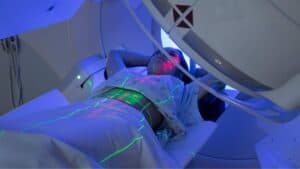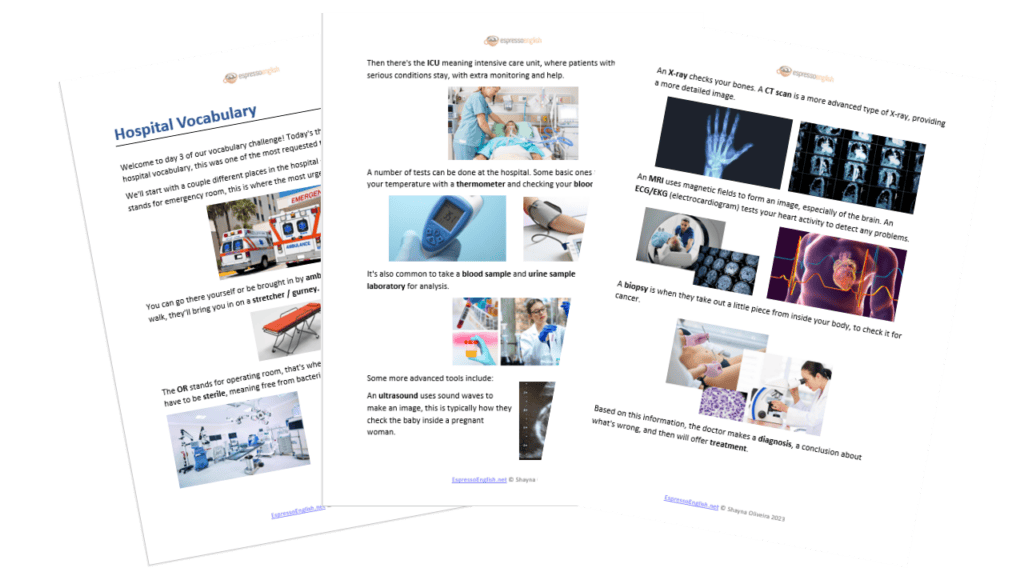
Join the Vocabulary Builder Course
Welcome to day 3 of our vocabulary challenge!
Today’s theme is medical and hospital vocabulary – this was one of the most requested topics. Once again, you can download the free PDF for this lesson by clicking on the link in the video description and entering your e-mail address.
We’ll start with a couple different places in the hospital – there’s the ER which stands for emergency room, these are where the most urgent conditions are treated. You can go there yourself or be brought in by ambulance if necessary.

If you can’t walk, they’ll carry you in on a stretcher/gurney.

The OR stands for operating room, that’s where they do surgery. Things in the OR have to be sterile, meaning free from bacteria.

Then there’s the ICU meaning intensive care unit, where patients with the most serious conditions stay, with extra monitoring and help.

A number of tests can be done at the hospital. Some basic ones are measuring your temperature with a thermometer and checking your blood pressure.


It’s also common to take a blood sample and urine sample and send them to the laboratory for analysis.

Some more advanced medical tests:
An ultrasound uses sound waves to make an image, this is typically how they check the baby inside a pregnant woman.

An X-ray checks your bones.

A CT scan is a more advanced type of X-ray, providing a more detailed image.

An MRI uses magnetic fields to form an image, especially of the brain.

An ECG/EKG tests your heart activity to detect any problems.

A biopsy is when they take out a little piece from inside your body, to check it for cancer.

Based on this information, the doctor makes a diagnosis, a conclusion about what’s wrong, and then will offer treatment.
This could be medicine – some of the most common are painkillers (to reduce/eliminate pain) and antibiotics (to kill bacteria). The medicine could be in the form of pills you swallow, a shot you receive, or IV medication that goes more continuously into your blood over time.

If you have a bad cut, you might need stitches to hold the skin together and help it heal.
If you’ve broken your leg, you’ll need a cast, a hard plaster covering around it to keep it stable until the bone heals.

You’ll also need crutches or a wheelchair to help you get around.

Surgery is another possible solution to certain medical problems. There’s outpatient surgery meaning you can go home the same day, and inpatient surgery meaning you stay overnight in the hospital.
For some surgeries, you get local anesthesia, meaning a shot that makes you numb, it temporarily takes away the feeling in that part of the body. And for others you get general anesthesia, meaning medication that makes you completely unconscious. The medical professional in charge of this is called an anesthesiologist.

For problems that affect your bones and muscles, you might need physical therapy – sort of like exercise sessions with someone who helps you strengthen that part of the body.

To treat cancer, there’s chemotherapy (strong medicine) and radiation therapy (using high-energy radiation to kill the cancer cells).


Someone whose kidneys are not working might need dialysis, where a machine cleans their blood – until they can maybe get a transplant (putting an organ from one person into another).

Someone who has had a limb (an arm or leg) amputated, meaning cut off due to disease or injury, can get a prosthetic arm or leg – one made of plastic or metal to allow them to use it in daily life.

Finally, when your hospital stay is over, you are discharged, meaning officially released.

Now you know a number of useful hospital words in English!
Remember to download your free PDF guide to review this vocabulary, and tune in tomorrow for the next lesson in our 100-word challenge.











